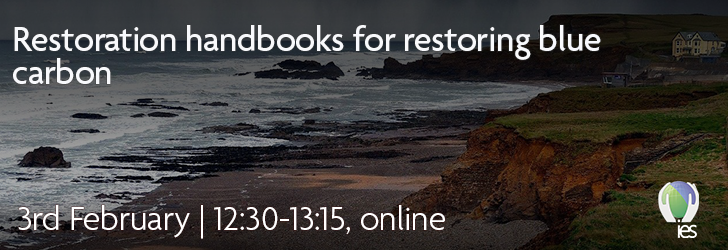There has been a lack of UK-wide guidance setting out how to practically carry out an estuarine and coastal habitat restoration project. This is a barrier, limiting information available for groups wanting to undertake restoration, notably around the complex regulatory process of gaining licences and permissions. To resolve this, at COP26 three new UK and Ireland Restoration Handbooks for restoring Blue Carbon were launched, as part of the Restoring Meadows, Marsh and Reef (ReMeMaRe) initiative.
The three handbooks cover the restoration of (i) saltmarsh, (ii) seagrass and (iii) intertidal habitats using dredged sediment, and partner with a fourth handbook for native oyster restoration launched in 2020. All aim to provide foundational and practical guidance on the restoration and conservation of these blue carbon habitats, from pre-project planning through to post project monitoring. They are aimed at catchment/coastal partnerships, eNGOs, industry or community groups and aim to provide new standards for the restoration of blue carbon habitats, in order to make it more achievable and accessible for all.
Our speaker
 Dr Ben Green is an Estuarine and Coastal specialist at the Environment Agency and project manager of the Restoring Meadows, Marsh and Reef Initiative (ReMeMaRe), a cross-Defra initiative looking to further habitat creation of saltmarsh, seagrass and native oyster beds in England. Since his PhD in saltmarsh and mangrove fish ecology and postdoctoral work, Ben has been working in UK estuarine and coastal management across government agencies for over 10 years. Previous roles included managing the collaborative Environment Agency / Natural England marine monitoring programme for England; coordinating evidence collection to support the designation of Marine Conservation Zones and developing a novel approach for subtidal seagrass monitoring for the Environment Agency. Ben’s current focus is on restoration, natural capital and blue carbon, particularly the development of tools, guidance and funding opportunities for recreating our lost estuarine and coastal habitats in partnership with eNGOs, industry and academia.
Dr Ben Green is an Estuarine and Coastal specialist at the Environment Agency and project manager of the Restoring Meadows, Marsh and Reef Initiative (ReMeMaRe), a cross-Defra initiative looking to further habitat creation of saltmarsh, seagrass and native oyster beds in England. Since his PhD in saltmarsh and mangrove fish ecology and postdoctoral work, Ben has been working in UK estuarine and coastal management across government agencies for over 10 years. Previous roles included managing the collaborative Environment Agency / Natural England marine monitoring programme for England; coordinating evidence collection to support the designation of Marine Conservation Zones and developing a novel approach for subtidal seagrass monitoring for the Environment Agency. Ben’s current focus is on restoration, natural capital and blue carbon, particularly the development of tools, guidance and funding opportunities for recreating our lost estuarine and coastal habitats in partnership with eNGOs, industry and academia.


